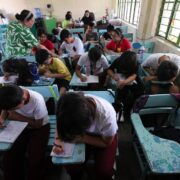Another indicator of learning crisis

The dismal passing rate of the latest civil service exams provides another angle to the gravity of the country’s worsening learning crisis.
The Civil Service Commission (CSC) announced this week that 46,470 individuals, or 14.57 percent of the total examinees, passed the Career Service Examination–Pen and Paper Test (CSE-PPT) held in March. This is hardly a significant improvement from the 14.40 percent passing rate in the August 2024 exams.
The CSC administers the CSE-PPT professional and subprofessional levels twice a year—the first in March and the second in August. These exams determine whether an applicant is eligible for government employment.
Out of 287,250 individuals who took the professional level exam, 42,472 passed, or a 14.79 percent passing rate; while 3,998 out of 31,727 examinees passed the subprofessional level exam, or a 12.60 percent passing rate.
Those who pass the professional level exams are qualified to assume technical, scientific, and managerial positions in government offices, provided they have completed four years of tertiary education. On the other hand, subprofessional passers are qualified for clerical and custodial service posts and need not be graduates of a four-year undergraduate course.
‘Functional illiterates’
Any Filipino citizen who is at least 18 years old and has no prior criminal conviction or dismissal from military or government service can take the CSE-PPT. It is hardly any surprise that thousands take the exams because many view government jobs as more secure compared to other fields.
However, the very low passing rate does not inspire confidence in the bureaucracy and government workforce and further validates the recent report by the Philippine Statistics Authority (PSA) on functional illiteracy.
Per the PSA, over 18 million Filipinos age 10 to 64 are classified as “functional illiterates,” or those who have problems in comprehension and understanding. This was after the agency changed the definition for “functional literacy” to include higher-level comprehension skills that go beyond basic reading, writing, and numeracy.
The implication is that the 2019 definition automatically categorizes high school graduates or junior high completers as functionally literate. Under the revised definition, however, they are not.
Poor education quality
The Department of Education should be held accountable for why students are allowed to graduate even if they have not met basic education standards. The poor education quality then manifests in students who lack the skills that make them competitive. It also makes it harder for them to score high in tests like the Programme for International Student Assessment, where Filipino students have been performing poorly in reading, math, and science, or qualifying exams like the civil service.
In case you’re wondering, the difficulty level of the civil service exams cannot be compared to the bar or the licensure exams administered by the Professional Regulation Commission.
Instead, they have been likened to an extended college entrance exam or general education test covering a variety of subjects, including current events, grammar and communication, numerical ability, reading comprehension, and general information. The professional level also tests the applicant on analytical ability, logic, and data interpretation, while the subprofessional level covers clerical ability and spelling.
Applicants are also tested on general information, including knowledge about the Philippine Constitution and pertinent laws such as Republic Act No. 6713 or the Code of Conduct and Ethical Standards for Public Officials and Employees.
Critical thinking
All the more reason that the passing rate for these exams should be higher. The subjects covered are manageable even for high school graduates and especially for college graduates. It is also assumed that those who finish Grade 12 or senior high school are not only capable of reading, writing, and solving math problems, but have developed skills that equip them for higher education or the workforce. These skills should include critical thinking, communication, collaboration, problem-solving, and digital literacy, among others.
The civil service exam results, however, indicate that this is not the case for the more than 85 percent who did not pass either the professional or subprofessional levels.
While failing the civil service exam is not the end of the world, it is not a good indication that only 14 out of every 100 applicant succeed. There are review centers that could help government hopefuls to prepare for the exams.
Still, the problem remains: if the government does not urgently address the learning crisis, more Filipinos will increasingly find themselves left behind and sidelined by opportunities, barely able to advance in their pursuit of a better life.




















